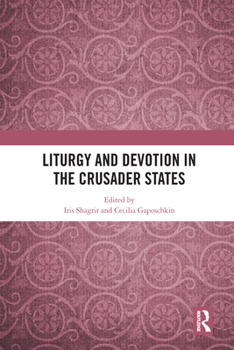Liturgy and Devotion in the Crusader States
Examining liturgy as historical evidence has, in recent years, developed into a flourishing field of research. The chapters in this volume offer innovative discussion of the Latin Kingdom of Jerusalem from the perspective of 'liturgy in history'. They demonstrate how the total liturgical experience, which was visual, emotional, motile, olfactory, and aural, can be analysed to understand the messages that liturgy was intended to convey. The chapters reveal how combining narrative sources with liturgical documents can help decode political circumstances and inter-group relations and decipher the core ideals of the community of Outremer. Moreover, understanding the Latins' liturgical activities in the Holy Land has much to contribute to our understanding of the crusade as an institution, how crusade spirituality was practised on the ground in the Latin East, and how people engaged with the crusading movement.
This volume brings together eight original studies, forwarded by the editors' introduction, on the liturgy of Jerusalem, spanning the immediate pre-Crusade and Crusade period (11th-13th centuries). It demonstrates the richness of a focus on the liturgy in illuminating the social, religious, and intellectual history of this critical period of ecclesiastical self-assertion, as well as conceptions of the sacred in this time and place.
This book was originally published as a special issue of the Journal of Medieval History.
Related Subjects
History




